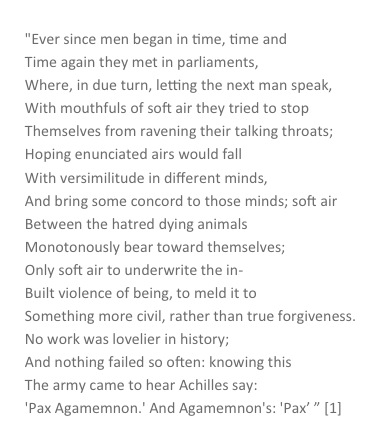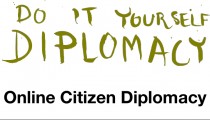The Independent Diplomat
Chapter 8 of the book “Independent Diplomat” by Carne Ross starts with a poem from Christopher Logue’s “War Music” [1]. Ross uses the poem to illustrate the discrepancy between the raw reality the United Nations Security Council is supposed to deal with, and the actual abstraction of their work.

Poem from Christopher Logue’s “War Music” used to illustrate the diplomatic deficit of the United Nations in the book “Independent Diplomat” by Carne Ross
The poem (to the right) uses the nature/culture dichotomy. The meetings in parliaments and the soft air that is exchanged symbolizes culture, while the violent animal metaphors symbolizes nature. While those are quite existential observations, in Ross’ book “Independent Diplomat” it is used to criticize the world of Diplomacy, the United Nations in particular.
In his “epistemology of diplomacy” Ross argues that the separation of reality and description is what creates an unfortunate, at times amoral environment in the security council and in diplomacy in general. Epistemology is the study of knowledge production, in this case how we try to describe reality in a valid, scientific way. Most epistemologists agree that description and experience will never coincide perfectly. When we use science to capture reality it will always be an approximation.
“Though we were at the heart of things, we seemed to be missing the point. Terms – diplomatic words, statistics, resolutions – were our tools to arbitrate a world of blood and agony. We were dealing with reality but working in abstraction. Something was missing.” (Ross 2007:154)
Ross tries to find out what it is that gets lost in diplomacy’s particular translation of reality. With just talking they try to stop the violence in the world (“With mouthfuls of soft air they tried to stop; Themselves from ravening their talking throats“). They try to use rhetorics and articulation to create peace between people. Versimilitude means that something appears as being true or real (“Hoping enunciated airs would fall; With versimilitude in different minds; And bring some concord to those minds“).
The “soft air” is a metaphor for “empty talk”, and this is all they have to insure us against “the inbuilt violence of being“: Man’s inhumanity to man, perpetual war. They try to structure the violence (“to meld it to; Something more civil“), this could be symbolic of the endless resolutions of the UN, the institutionalization of war, the just war doctrine.
The end of the poem highlights the sad truth that stopping war is the most important job on the planet, and yet it is the one that keeps failing.
Ross attributes this failure in part to what he calls the “diplomatic deficit” in the UN security council. The negotiations are too divorced from human experience: the discourse is too rationalistic, quantitative and theoretical. Most importantly, diplomacy fails to engage the very people, it is supposed to serve. Ross argues it is inherently undemocratic, lacking in transparency and accountability.
For all these reasons and more, Ross left the Foreign Office and started a non-profit. In 2004 when Ross resigned from the British Foreign Office (Read more here) he started Independent Diplomat right away. He calls Independent Diplomat a non-profit diplomatic advisory group. Its purpose: to remedy the diplomatic deficit at the UN.
Independent Diplomat serves small, inexperienced or under-resourced countries and political groups with diplomacy. Independent Diplomat gives behind-the-scenes strategic advice and practical assistance for instance with speeches and communications to the UN Security Council.
My personal interpretation of their role is something like a public defender. Independent Diplomat attempts to equal the playing field between those with the money and power and those who have a legitimate claim to influence on a decision. According to Ross, those who have a right to be heard in a certain international negotiation is often not invited to partake or does not have the resources to be competitive in the negotiation (for instance by having lawyers to formulate draft resolutions). This is what Independent Diplomat tries to remedy.
1. Christopher Logue “War Music”: Unviversity of Chicago Press (2003).

